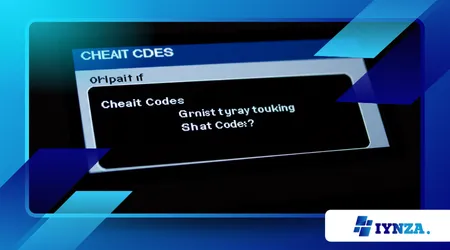How to Use Cheat Codes Without Ruining Your Gaming Experience

Cheat codes have been part of gaming since its earliest days. To use cheat codes is to tap into a layer of play that often shifts the rules
Anúncios
That line between fun and frustration is thin. And sometimes, crossing it can turn an immersive journey into something that feels empty.
To use cheat codes wisely is to understand their weight. It’s not just about pushing a few buttons or entering a command. It’s about how that change reshapes the game.
When used with intention, cheats can revive an old title. They can unlock joy, open new paths, and extend playtime far beyond the ordinary.
But when abused, they can break the very thing that made the game worth playing in the first place.
The Psychology of Cheating
Cheats often start as curiosity. Can I fly? Can I skip this level? Or give myself infinite health and just explore? That feeling is natural.
You want to stretch the world. You want to experiment. In single-player games, the consequences seem small. No one else is affected. No one is cheated out of a win. And yet, something subtle shifts.
Challenge disappears. Risk fades. Victory stops meaning what it did. That dopamine hit you get from beating a tough boss? It vanishes when you know you can never lose. The tension that held your focus? It melts away. What’s left might still look like the game. But it no longer feels like one.
That doesn’t mean you should avoid cheats. It means you need to choose your moments.
Why People Use Cheat Codes
Sometimes, it’s about time. You’ve played a game for hours. You’re stuck on one part. It’s not fun anymore. You just want to move forward. So you find a shortcut. And maybe that shortcut brings you back into the story. That’s valid. Games are meant to be enjoyed, not endured.
Other times, it’s about control. You want to create chaos, want to test boundaries and mess around without consequences. And that’s okay too.
Some of the most iconic moments in gaming come from bending the rules. Think about spawning a tank in the middle of a city in GTA. Or using god mode to explore a horror game without fear. These are experiences in their own right.
But the key is knowing what you’re sacrificing. If you understand what you’re giving up—and why—you can make that decision without regret.
Read also: How to Turn Your Passion for Gaming into a Career
When Cheats Add Value
Certain games almost invite you to cheat. They come with debug menus. With developer modes. With cheat consoles built into the interface.
These aren’t accidents. They’re tools. And using them doesn’t break the game—it enhances it.
Sandbox games are a perfect example. Titles like Minecraft, Skyrim, and The Sims thrive on experimentation. Here, cheats aren’t a crutch.
They’re part of the toolbox. They let you build faster. Test ideas. Create without boundaries. You’re not bypassing content. You’re creating new content. That’s not the same thing.
Even in story-driven games, there’s room for smart cheating. Speedrunners often use glitches and exploits to push games to their limit. They study the code.
They understand the mechanics better than anyone. And through their eyes, the cheat becomes part of the challenge. It’s not about escaping difficulty. It’s about mastering the system.
Where Things Go Wrong
Not every game welcomes cheats. Some are balanced carefully. Built with precise pacing. Designed to make you feel tension, loss, and triumph. In those spaces, cheating breaks something fragile.
It turns survival into walking. It turns strategy into repetition. And once that tension is gone, it rarely comes back.
Games that focus on narrative suffer even more. When you cheat through key moments, you lose the weight of the story.
That hard-earned escape doesn’t land the same way when you noclip through walls. That narrow victory over an enemy feels hollow when you had infinite ammo the whole time.
The illusion breaks. And it’s hard to rebuild once it’s gone.
The Difference Between Tools and Crutches
To use cheat codes responsibly, you have to ask yourself one thing: am I using this to enhance the game or avoid it?
If the cheat lets you explore more deeply, it’s a tool. If it lets you test new ideas or reach new areas, it’s opening the game up.
But if it lets you skip something hard just because it’s uncomfortable, it becomes a crutch. And that can be dangerous. Not because it’s wrong—but because it can take away the very thing that makes games feel alive.
Struggle is part of the process. Challenge gives meaning to success. Without it, even victory feels dull.
Modding and Community Cheats
There’s a whole world beyond built-in cheat codes. Modding communities create tools that blur the line between cheat and feature. They add god modes, teleportation, item spawns. But they also add custom maps, new characters, alternate rules.
In many cases, these cheats aren’t about breaking the game. They’re about bending it into something new.
Using cheats from mods can be a powerful way to breathe new life into old favorites. But again, intention matters. What are you hoping to find on the other side?
Competitive Games: No Room for Cheats
Everything changes in online multiplayer. Here, cheating crosses a line. It stops being playful and starts being unfair. Aimbots, wallhacks, and speed mods don’t just alter your experience—they ruin it for others.
Cheating in these spaces erodes trust. It poisons the challenge. And it can get you banned.
There’s no grey area here. If you use cheats to gain an edge against real opponents, you’re not just breaking rules. You’re breaking the social contract that makes gaming fun for everyone.
That’s why developers invest so much in anti-cheat systems. And why most communities reject cheaters outright.
Nostalgia and the Power of Revisiting Old Codes
There’s something oddly comforting about returning to old games and entering a familiar code. The muscle memory kicks in.
You remember where you were when you first discovered it. The cheat becomes more than a shortcut. It becomes part of your story.
Games like Contra, Doom, and Age of Empires carry cheat codes that live in pop culture. They’re not just tools. They’re touchstones.
Using them doesn’t feel like cheating anymore. It feels like coming home.
But even then, the question remains. Are you doing it to relive joy? Or to skip past something that once mattered?
Learning Through Cheats
Ironically, cheats can teach you how games work. When you remove the risk of failure, you focus more on systems. You notice patterns. You explore with curiosity instead of fear.
Some players start with cheats and end up falling deeper in love with the game. They use the extra control to understand how levels are built. How AI behaves. How combat balances around scarcity.
And that knowledge makes them better players. Not because they cheated. But because they paid attention.
Building a Healthy Relationship with Cheats
In the end, to use cheat codes without ruining your experience is to treat them like any powerful tool—with respect.
Ask yourself: What do I want from this game right now? Do I want freedom? Do I want to test something? Or am I avoiding something I should face?
The answer doesn’t have to be right. It just has to be honest.
If you stay curious, if you stay playful, and if you stay aware of what you’re gaining and what you’re losing, cheat codes can be a gift.
But when you forget why you started playing… that’s when even the most powerful cheat stops feeling like fun.
Questions About Cheat Codes and Gameplay
Do cheat codes ruin the challenge of a game?
They can, but it depends on how you use them. If they replace the challenge instead of enhancing it, they often make the game feel less rewarding.
Are cheats ever encouraged by developers?
Yes. Many games include official cheat systems or developer modes meant to be explored by players after finishing the main game.
What’s the difference between mods and cheats?
Mods often change or expand the game’s content. Cheats usually offer in-game advantages. Some mods include cheats, but not all cheats come from mods.
Can using cheats improve your understanding of a game?
Absolutely. Cheats let you explore systems, test ideas, and see how mechanics function without pressure.
Is it okay to use cheats in single-player games?
Yes. As long as you understand what you’re gaining—and what you might be giving up—they’re a personal choice.
